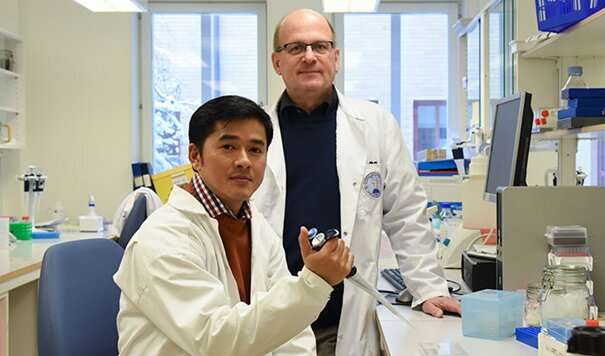Turning off HSF5 gene leads to less and poorer quality sperm

In research on zebrafish, Örebro researchers have identified a gene that is essential for producing sperm. Results show that fewer and poorer quality sperm are produced when the gene was turned off with the Crispr/Cas9 technique. The next step is to test whether the same is true in humans.
"The same gene is found in humans, and it is possible that it affects people in the same way. If the gene is altered in men, they may lead to them not being able to have children," says Per-Erik Olsson, professor of biology at Örebro University.
The research is a collaboration with researchers in Singapore at the Temasek Life Sciences Laboratory. Both research teams investigate what determines whether we become male or female and have worked together for over eight years.
"They contacted us for a collaboration to find out more about this particular gene – HSF5 – and what it does," says Per-Erik Olsson, who has conducted the study together with Ajay Pradhan, a biology researcher at Örebro University.
With the help of the new technology, Crispr/Cas9, the researchers were able to solve the riddle. With this new technology, they could turn off the HSF5 gene in zebrafish to see what happens when the gene could not execute its task.
"The result is fewer sperms and the ones produced are not viable. Their heads are far too big, and they have short tails. They simply cannot swim," says Ajay Pradhan.
On the other hand, the gene does not seem to have any effect on women – researchers saw no difference when the gene was blocked in female zebrafish.
"Now we know that the protein created from the HSF5 gene is important for sperm development. The next step for us is to find out what determines how much protein is produced," explains Ajay Pradhan.
"It may be that certain chemicals affect this gene, thus leading to infertility. Many have difficulties in getting pregnant today, and we do not know why so more research is needed," says Per-Erik Olsson.
More information: Jolly M. Saju et al. Heat Shock Factor 5 Is Essential for Spermatogenesis in Zebrafish, Cell Reports (2018). DOI: 10.1016/j.celrep.2018.11.090
Journal information: Cell Reports
Provided by Örebro University


















